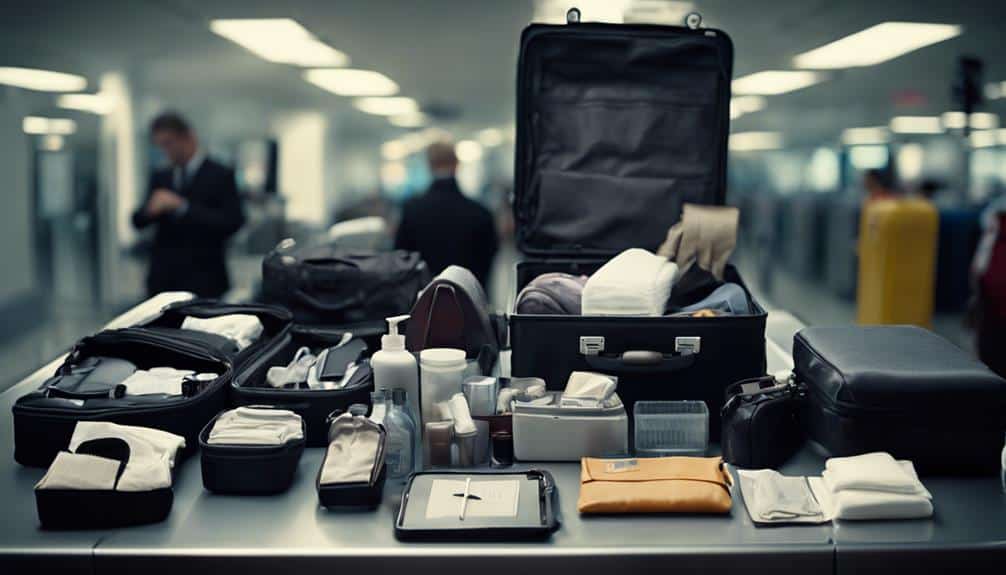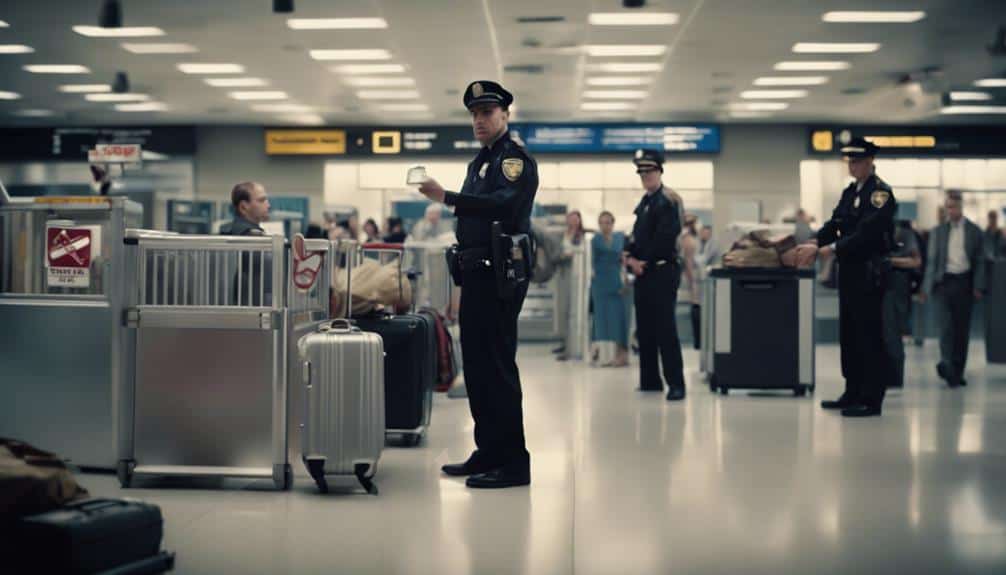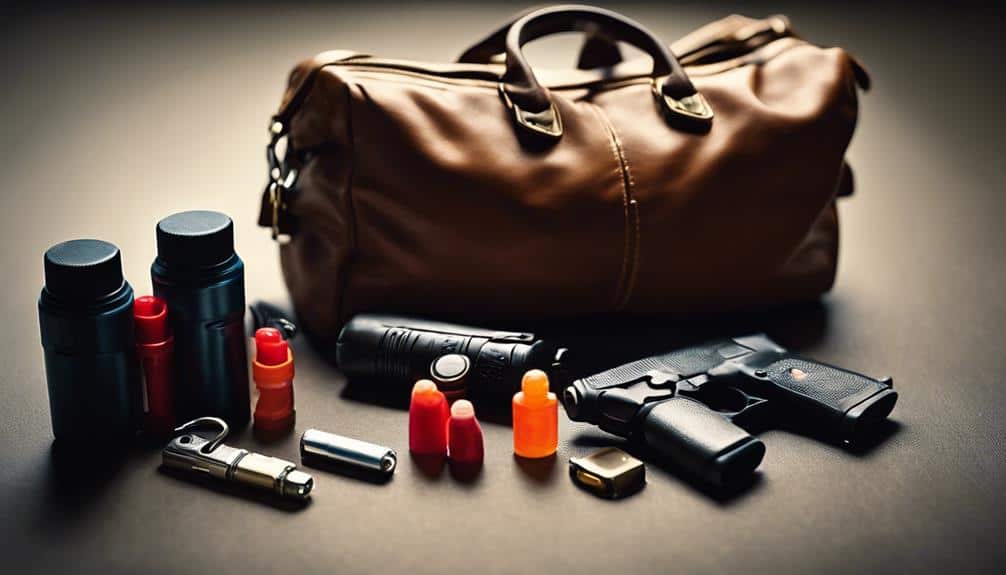You can’t take a
collapsible baton in your
carry-on, my friend. The TSA will definitely snag it, and you don’t want that hassle. However, it’s still possible to bring it along in your
checked baggage. Just lock it up tight and declare it to the airline. Imagine trying to explain it to security without any prep – talk about a nightmare! Pay close attention to your
local laws to avoid any legal messes when you arrive. The whole thing sounds like a lot of work, doesn’t it? Stick around, and you might find some easier options for self-defense on the go.
Legal Status of Batons
Understanding the
legal status of
collapsible batons is essential before you attempt to bring one on a plane. You might think it’s just a handy item for
personal safety, but many places consider it an
offensive weapon. Trust me, you don’t want to land in a new city only to find yourself in hot water because you didn’t check the
local laws first.
In the United States, things get even trickier. Some states are cool with you carrying a baton, whereas others will hit you with strict regulations or outright bans. Imagine trying to explain to a stern-faced officer why you’ve got a baton in your bag—yikes! Airports and airlines are another beast altogether.
Batons are often listed as
prohibited items in carry-on luggage. So, unless you want your baton to be confiscated, you’ve got to stash it in
checked baggage.
Ignoring local laws and airline policies can lead to some
serious consequences—think criminal charges, civil penalties, or having your prized baton taken away. Before you travel, do your homework on local laws and airline rules. It’ll save you a ton of hassle and keep you on the right side of the law.
TSA Regulations
When it comes to flying with a collapsible baton, you can’t just toss it in your carry-on bag and hope for the best; the
TSA strictly prohibits that. You can pack it in your
checked baggage, but you’ll need to declare it to the airline and guarantee it’s
properly packaged and locked for safety. Remember, the TSA officers have the final say, so make sure you follow their rules to avoid any trouble at the airport.
Prohibited in Carry-On
Collapsible batons are strictly prohibited in carry-on luggage according to TSA regulations. You might think that small, compact items would be fine to bring onboard, but the TSA has other ideas. Their rules are clear: collapsible batons, no matter the size or material, are a big no-no in your carry-on. This strict policy helps keep everyone safe during flights, and trust me, you don’t want to be the person holding up the line because you forgot your baton in your bag.
Imagine the embarrassment when TSA officers confiscate your baton at the security checkpoint. To avoid this hassle, you’ll need to pack it in your checked baggage and let your airline know. Here’s a quick rundown to keep things simple:
- Don’t pack collapsible batons in your carry-on: They’re outright banned.
- Safety first: The TSA’s strict rules aim to keep flights safe and secure.
- Avoid confiscation: If found, your baton will be taken away by TSA officers.
- Use checked baggage instead: Declare it to your airline for proper transport.
Checked Baggage Requirements
To safely transport your collapsible baton on a plane, you’ll need to follow specific
TSA regulations for
checked baggage. First off, you absolutely can’t bring it in your
carry-on luggage—TSA’s rules are clear on that. But don’t worry, your baton is allowed in checked baggage. Just make sure to
declare it to the airline during check-in.
Now, here’s where it gets a bit tricky. You should
properly package and lock your baton in your checked bag. This is essential to prevent any accidental discharge or damage. Imagine your suitcase doing an impromptu magic trick and opening mid-flight—yikes!
Security Officers will likely give your checked baggage some extra attention during the screening process. Since collapsible batons are classified as weapons, they’ll undergo
additional scrutiny. So, don’t be surprised if your bag gets a bit more love from the TSA folks.
Lastly, be a savvy traveler and check out the
state and local laws regarding batons at your destination. Regulations can vary, and the last thing you want is to get in hot water over something as avoidable as this. Safe travels!
Packing Guidelines
Your collapsible baton’s journey starts with understanding the strict packing guidelines set by the Transportation Security Administration (TSA). First off, you can’t just toss it in your carry-on. The TSA has labeled collapsible batons as prohibited items in carry-on luggage, so you’ll need to pack it in your checked baggage. But don’t worry, you’re not completely out of luck—just follow a few straightforward rules to stay on the safe side.
When you’re packing this item, be sure to:
- Declare It: You’ve gotta let the folks at the check-in counter know you’ve got a baton in your checked baggage. It’ll save you from potential headaches later.
- Proper Packaging: Make sure it’s securely packed. You don’t want it rattling around; use padding if necessary.
- Check Local Laws: Remember, where you’re going matters. Baton possession laws vary, so a little research can prevent big problems.
- Be Ready for Inspection: Even in checked baggage, your baton might still get inspected. TSA agents have the right to confiscate any undeclared prohibited items.
Pack smart, stay informed, and your journey should be smooth sailing—or flying, in this case!
Airport Security Incidents
Dealing with recent incidents at
JFK Airport, travelers have faced serious consequences for attempting to carry
collapsible batons in both carry-on and
checked luggage. You might think it’s no big deal, but these attempts have led to arrests and heightened security responses. The
TSA regulations are crystal clear: batons in
carry-on luggage are a big no-no. If you try, you’re looking at
confiscations and fines, not exactly the souvenirs you want from your trip.
The final decision rests with the TSA officer on whether a baton in checked baggage is permitted. Unfortunately, even if it’s in your checked bag, it still poses other
security concerns. This means you’ll likely face
additional scrutiny and delays during the baggage screening process. Imagine standing there, watching your suitcase get dissected piece by piece. Not fun, right?
Awareness of TSA policies and local laws is essential. You don’t want to be that person holding up the line or, worse, getting escorted away by law enforcement. So, do yourself a favor: leave the baton at home. Your future self, and probably everyone else at the airport, will thank you.
Consequences of Violations
Getting caught with a collapsible baton in your carry-on luggage can lead to serious consequences, starting with immediate confiscation by security personnel. Imagine the embarrassment and frustration when Security pulls you aside for additional screening. But that’s just the tip of the iceberg.
You’ll also face hefty civil penalties. The TSA can slap you with fines up to $11,000 for non-compliance. That’s a lot of money just because you didn’t follow the rules. And it doesn’t stop there. If you fail to declare a baton in your checked luggage, you could face even worse repercussions, like criminal charges.
Expect increased scrutiny. Security might decide you need extra screening, which could delay your journey and make you miss your flight. And let’s not forget, non-compliance doesn’t just affect you; it impacts everyone around you by contributing to heightened security measures, slowing down the entire airport process.
Here’s what you might deal with:
- Immediate confiscation: Security takes your baton away.
- Civil fines: Up to $11,000 in penalties.
- Criminal charges: For not declaring in checked luggage.
- Delayed travel: Extra screening means more waiting.
Traveler Recommendations
When planning to travel with a collapsible baton, it’s crucial to familiarize yourself with both
local laws and
TSA guidelines to avoid unnecessary complications. First off, check the local laws where you’re traveling. Regulations vary, and the last thing you want is to land somewhere only to find out your item is
prohibited.
Now, let’s talk about TSA rules. Collapsible batons can’t be carried in your hand luggage, but whether the item is allowed in your
checked baggage depends on how you pack it. Make sure it’s in a
hard-sided case, and declare it when you check in. Trust me, you don’t want any surprises at
security! Informing the airline ahead of time can save you a lot of headaches.
Be aware that airport security is tight; some recent incidents have even led to arrests for carrying batons. You’ve got to comply with TSA regulations to avoid
serious trouble. Also, consider if you really need the baton. Alternatives that comply with TSA guidelines might make your trip smoother and stress-free.
Alternatives to Batons
Considering alternatives to batons can make your travel experience much smoother and stress-free. Instead of worrying about whether your collapsible baton will get through security, you can opt for other self-defense tools that are allowed in carry-on and checked baggage. For instance,
panic alarms emit loud noises to draw attention and deter threats.
Here are some handy alternatives:
- Personal Alarms: These nifty gadgets emit loud noises to deter threats. They’re typically allowed in both carry-on and checked baggage, giving you peace of mind.
- Self-Defense Keychains or Tactical Pens: Small but mighty, these items are generally permitted and can easily fit in your pocket or purse.
- Personal Pepper Spray: If it meets TSA regulations (under 4 oz and less than 2% tear gas), this can be packed in checked baggage.
- Small Pocketknife: A pocketknife with a blade under 2.36 inches is allowed in carry-on, but remember, it’s subject to additional screening.
Imagine having these tools at your disposal, making you feel safer without the hassle. Plus, consider enrolling in self-defense classes. These workshops teach skills that don’t require carrying physical weapons, boosting your confidence. Traveling doesn’t have to be stressful—just be prepared with these effective alternatives.
Community Opinions
Travel forums are buzzing with diverse opinions about carrying
collapsible batons on planes. Many travelers are concerned about the legality and safety of bringing such an item on board. It’s crucial to understand
TSA regulations, as opinions on whether an item like a baton is allowed through the checkpoint are mixed. Some seasoned travelers suggest avoiding the hassle altogether by purchasing batons locally at your destination.
You’ll find varied viewpoints on the necessity of bringing a baton. On one hand, some feel it’s a
security measure, but others worry it could be
seen as a weapon and raise suspicion during security screenings. The risk of
confiscation looms large in these discussions, especially during
baggage checks. If an item is deemed offensive or prohibited by TSA, it might not make it past the checkpoint.
Many forum participants recommend checking
airline policies and local laws about weapon transport to guarantee you’re compliant. For peace of mind, consider packing the baton in your
checked luggage rather than your carry-on. After all, you don’t want your travel plans to rest on whether you can keep your baton. Better safe than sorry, right?
Frequently Asked Questions
Can You Fly with an Extendable Baton?
Flying with a collapsible baton is as tricky as a maze. Regulations prohibit it in carry-on bags. Check it with proper packing, declare it, and understand self-defense laws and airline security policies to guarantee travel safety measures.
Can You Take a Collapsible Cane on a Plane?
Yes, you can take a collapsible cane on a plane. Collapsible cane benefits include easy portability. Follow travel cane regulations and airport security guidelines. Inform TSA officers for smoother screening. Remember these cane safety tips to avoid issues.
Is It Legal to Carry an Expandable Baton in Usa?
Ever wondered if it’s legal to carry an expandable baton in the USA? Legal restrictions vary by state laws. Airline policies often require declaration in checked baggage. Self-defense legality also depends on local regulations. Always check first!
What Self-Defense Items Can You Bring on a Plane?
You can bring personal alarms for personal safety through security screenings in both carry-on and checked baggage. However, travel restrictions on batons and stun guns mean you must check them and follow self-defense laws at your destination.








